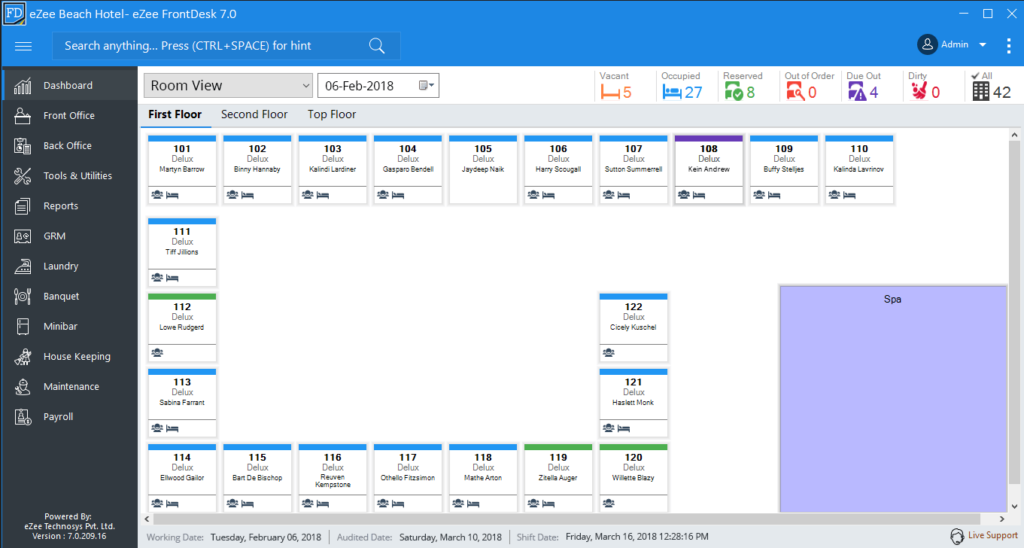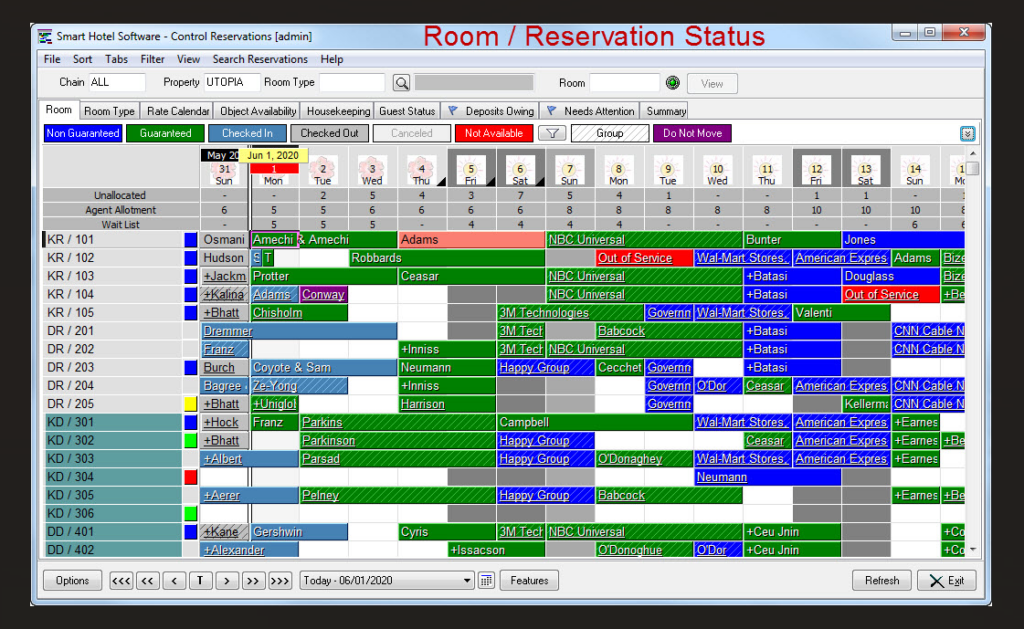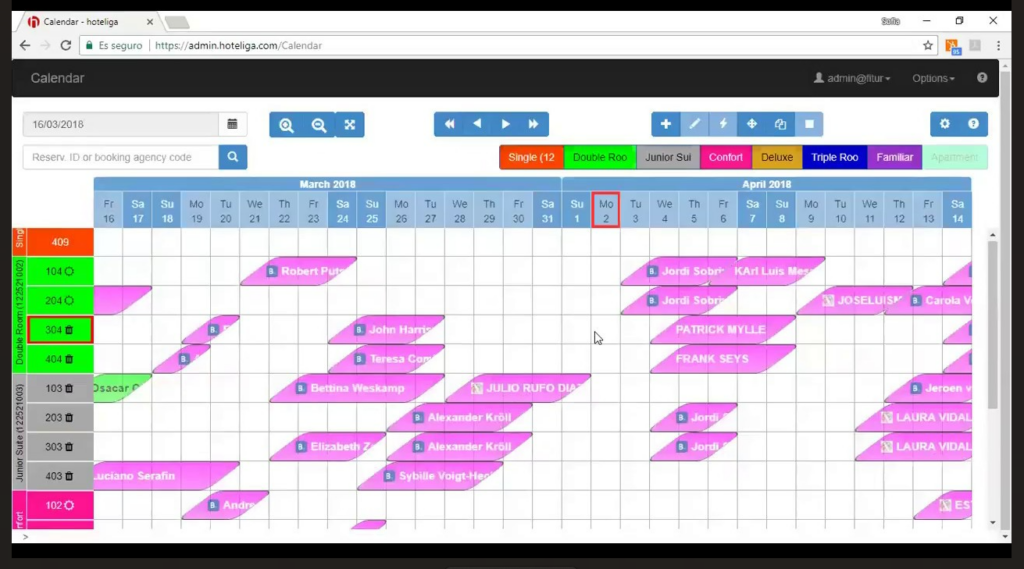As a hotelier, staying up-to-date with the latest technologies is essential to offer your guests the best possible experience. One such technology is front desk hotel software.
When it comes to front desk software for hotels, there are many different options to choose from. It can be hard to decide which is best for your property. This article will look at the best front-desk hotel software options available. We will discuss the benefits of using each one, how much they cost, and the key features to look for when deciding.
In this article, we'll discuss what front desk hotel software is, how it works, and its benefits. We'll also consider the best front-desk hotel software options currently available.
So, whether you're in the market for a new system or are just curious about what's out there, read on!
What is Hotel Front Desk Software?
Hotel front desk software is a computer application that helps hotel staff manage reservations, check-ins, and check-outs. It also helps team keep track of guest payments and room assignments.
Most hotel front desk software applications allow you to:
- Manage Reservations
- Check guests in and out
- Print room keys
- Print invoices
- View reports
The benefits of using hotel front desk software include increased efficiency, reduced staff workload, improved customer service, and improved accuracy.
The cost of hotel front desk software varies depending on the features and complexity of the application. However, most applications range in price from $500 to $2,000 per license.
12 Best Hotel Front Desk Software Shortlist
After a thorough evaluation, I've curated a list of the best front desk software tools that best address the challenges you face.
- Ezee Frontdesk - Best for all-in-one hotel solutions
- Maestro PMS - Best for contact-free staff interactions
- Cosmo - Best for multi-property management
- CloudBeds - Best for centralized hotel operations
- Smart Hotel Software - Best for diverse property features
- Hoteliga - Best for user-friendly interfaces
- Little Hotelier - Best for boutique hotels
- SkyTouch - Best for growth-ready hotels
- innRoad - Best for independent hoteliers
- Operto - Best for integrating smart devices
- Eptura - Best for room-centric management
- Mews Hospitality Cloud - Best for cloud property management
Overviews of the 12 Best Hotel Fron Desk Software
1. Ezee Frontdesk - Best for all-in-one hotel solutions

Ezee Frontdesk provides a comprehensive hotel management system that integrates a variety of functionalities vital for the hospitality industry. By offering an all-in-one solution, it effectively addresses the diverse needs of hotel operations.
Why I Picked Ezee Frontdesk:
I selected Ezee Frontdesk after closely examining numerous property management tools available today. It consistently emerged as a top contender due to its versatile features and modules. Moreover, in line with its tagline of being an all-in-one solution, it delivers an integrated approach, making it best suited for hotels seeking comprehensive software.
Standout features & integrations:
Ezee Frontdesk has a robust booking engine, simplifying the reservation management process. Its integrated channel manager ensures that all bookings, from an OTA or direct channels, are synchronized to prevent overbooking. The software solution also provides a point of sale (POS) system, catering to outlets within the hotel, like restaurants or gift shops. Key integrations include connectivity with platforms such as Airbnb, Booking.com, and Expedia, ensuring a wider reach for the property.
Pricing:
From $20/user/month (billed annually) + $50 base fee per month
Pros:
- Integrated booking engine and channel manager.
- Comprehensive point of sale system.
- Connectivity with major OTAs and platforms like Airbnb.
Cons:
- Steeper learning curve for those new to hotel management systems.
- Requires consistent internet connection for cloud-based property management system.
- Some modules might be superfluous for smaller b&bs or independent hotels.
2. Maestro PMS - Best for contact-free staff interactions

Maestro PMS offers an intuitive property management solution tailored to the hospitality industry. Its commitment to enabling contact-free staff interactions proves essential, especially in today's health-conscious environment.
Why I Picked Maestro PMS:
I chose Maestro PMS after weighing the options and comparing its features to other tools in the market. Its emphasis on safety through contact-free interactions significantly influenced my decision, making it stand out. This focus on minimizing physical interactions is why Maestro PMS is best for ensuring staff can work safely while maintaining an excellent guest experience.
Standout features & integrations:
One of Maestro PMS's defining features is its mobile app, which facilitates contactless front desk operations, allowing guests and staff to interact without direct contact. The software solution integrates a robust booking engine, ensuring reservation management. Additionally, its integration with major OTAs, like Booking.com and Expedia, helps properties maximize their occupancy rates.
Pricing:
From $25/user/month (billed annually) + $60 base fee per month
Pros:
- Dedicated mobile app for contact-free operations.
- Comprehensive booking engine integration.
- Connectivity with major OTAs for increased revenue.
Cons:
- Might be more features than smaller properties like b&bs need.
- Requires training to maximize all its modules and tools.
- The pricing structure may not be favorable for smaller, independent hotels.
3. Cosmo - Best for multi-property management

Cosmo is a cloud-based property management system tailored for the hospitality business, streamlining operations across multiple properties. This tool shines especially when handling complex management tasks for more than one property, aligning with its strengths in multi-property management.
Why I Picked Cosmo:
I selected Cosmo after carefully judging it against its peers in the property management arena. Its prowess in managing multiple properties simultaneously caught my attention, setting it apart from many others. This unique multi-property capability is why I determined Cosmo best for hoteliers overseeing multiple establishments.
Standout features & integrations:
A core feature of Cosmo is its integrated booking engine, allowing for efficient reservation management across different properties. Furthermore, it boasts an intuitive interface with a channel manager that connects with major OTAs like booking.com and Expedia, ensuring maximized occupancy and increased revenue. Another defining aspect is its CRM module, which helps keep track of guest profiles and improves the overall guest experience.
Pricing:
From $30/user/month (billed annually) + $70 base fee per month
Pros:
- Comprehensive multi-property management tools.
- Advanced CRM for detailed guest profiles and improved guest experience.
- Integration with major OTAs for optimal occupancy.
Cons:
- Might be overwhelming for single property owners.
- Requires time to master all available modules.
- May not be the most budget-friendly option for smaller establishments.
4. CloudBeds - Best for centralized hotel operations

CloudBeds is a holistic software solution designed to streamline hotel management tasks. As a cloud-based property management system, it centralizes hotel operations, ensuring smooth and efficient workflows, making it ideal for centralized operations.
Why I Picked CloudBeds:
In my quest to determine the top hotel management systems, CloudBeds emerged as a front-runner. I chose it primarily because of its unique ability to centralize diverse hotel operations under one umbrella, a characteristic uncommon in other systems. After comparing and judging various systems, I was convinced that CloudBeds is optimal for those looking to centralize their hotel management.
Standout features & integrations:
CloudBeds showcases a robust booking engine, aiding in effective reservation management. Its channel manager connects with various OTAs like Airbnb and booking.com, maximizing occupancy rates. Furthermore, its POS system improves front desk operations, offering streamlined payment processing and revenue management.
Pricing:
From $50/user/month (billed annually) + $100 base fee per month
Pros:
- Comprehensive property management software with centralized functions.
- OTA integrations for broader reach and maximized bookings.
- Efficient POS system for smooth payment processes.
Cons:
- Might be slightly complex for newcomers to grasp initially.
- Pricing may be on the steeper side for small-scale hotels.
- Advanced modules may require dedicated training sessions.
5. Smart Hotel Software - Best for diverse property features

Smart Hotel Software offers a comprehensive solution for hotels and properties with diverse features and services. Catering to various property types, from B&BS to large hotel chains, it simplifies management tasks and improves the guest experience by managing diverse property features.
Why I Picked Smart Hotel Software:
While selecting software solutions, Smart Hotel Software particularly stood out to me because of its versatility in accommodating different property features. I judged it based on its capability to handle variations from independent hotels to large hotel chains effortlessly. I chose this tool because it's unmatched for properties that offer a wide spectrum of features to their guests.
Standout features & integrations:
Smart Hotel Software boasts a robust booking engine that simplifies reservation management. Integrated with OTAs such as Airbnb and booking.com, it ensures optimal occupancy. Furthermore, its intuitive property management system makes front desk operations and payment processing hassle-free for diverse property features.
Pricing:
From $45/user/month (billed annually) + $60 base fee per month
Pros:
- Offers a property management system suitable for properties with diverse features.
- Intuitive user interface ensures efficient front desk operations.
- Optimal integrations with major OTAs for increased bookings.
Cons:
- Some advanced modules might be overwhelming for beginners.
- Might not be the most cost-effective option for very small properties.
- Requires periodic training to utilize the software's full potential.
6. Hoteliga - Best for user-friendly interfaces

Hoteliga is a property management software solution tailored for the hospitality industry, offering a range of features from reservation management to revenue management. What sets Hoteliga apart is its emphasis on a user-friendly interface, making tasks smoother for hoteliers and streamlining operations.
Why I Picked Hoteliga:
While comparing various hotel management systems, Hoteliga caught my attention because of its intuitive interface. My determination was based on the tool’s ability to simplify complex tasks through its easy-to-use design. I chose this platform, believing it excels in providing the hospitality industry with a user-friendly experience, which is crucial for efficient front desk operations and overall management.
Standout features & integrations:
Hoteliga offers a robust booking engine that ensures optimized occupancy and a guest experience. Furthermore, its property management system has integrated modules catering to various needs, from point of sale to guest profiles. With critical integrations, including Airbnb, booking.com, and Expedia, Hoteliga makes managing bookings from various OTAs easy.
Pricing:
From $30/user/month (min 3 seats)
Pros:
- Intuitive interface suitable for all levels of computer proficiency.
- Comprehensive property management system with diverse modules.
- Effective integrations with major OTAs, improving booking capabilities.
Cons:
- Might lack advanced features for larger hotel chains.
- Integration with some niche OTAs might be missing.
- Customer support response times can be improved.
7. Little Hotelier - Best for boutique hotels

Little Hotelier is a property management software solution, designed with boutique hotels in mind. It offers a range of tailored features to help small establishments increase revenue while providing a memorable guest experience.
Why I Picked Little Hotelier:
In my quest to find the most suitable management tools for different types of hotels, Little Hotelier emerged as a top pick for boutique establishments. Through comparing and judging various software solutions, it became evident that Little Hotelier had a unique offering tailored to boutique hotels' nuances and specific requirements. I chose it for this list because it truly understands and caters to the particular needs of these smaller, more intimate properties.
Standout features & integrations:
Little Hotelier boasts a comprehensive booking engine that streamlines reservation management for boutique establishments. Their cloud-based property management system ensures smooth front desk operations with integrated modules that range from guest profiles to payment processing. Key integrations encompassing Airbnb, booking.com, and GDS facilitate bookings across multiple platforms, ensuring boutique hotels can maximize their occupancy rates.
Pricing:
From $50/user/month (billed annually)
Pros:
- Tailored features specifically for boutique hotels, making it an optimal choice for such establishments.
- Robust integrations with major booking platforms improve online booking capabilities.
- Comprehensive cloud-based property management system for streamlined operations.
Cons:
- Might be over-featured for very small bed and breakfast establishments.
- Limited customization options for larger hotel chains.
- Periodic updates might require a short learning curve for users.
8. SkyTouch - Best for growth-ready hotels

SkyTouch is a comprehensive hotel management system that integrates various modules, enabling hotels to streamline operations and improve guest experience. It's designed with scalability in mind, making it an ideal choice for hotels looking to expand and accommodate future growth.
Why I Picked SkyTouch:
When determining which tools would cut this list, I meticulously judged each option, comparing them based on functionality, flexibility, and adaptability. I believe SkyTouch differentiates itself due to its focus on scalability and its robust suite of management tools. I chose it because it's uniquely positioned to support hotels ready to grow and evolve, making it "Best for growth-ready hotels."
Standout features & integrations:
SkyTouch provides an intuitive booking engine that improves reservation management and integrates with a cloud-based property management system. This ensures consistent front desk operations, while the property management software includes specialized modules for tasks like revenue management and payment processing. It boasts impressive integrations, including those with major platforms like Airbnb, Expedia, and GDS, thus improving a hotel's presence across various channels.
Pricing:
From $60/user/month (billed annually)
Pros:
- Offers a suite of comprehensive management tools that cater to hotels of varying sizes.
- Robust integrations, especially with major booking platforms, facilitate greater occupancy and visibility.
- Emphasis on scalability makes it an ideal choice for growth-focused establishments.
Cons:
- Might be overwhelming for smaller properties due to its extensive feature set.
- Periodic system updates may require staff training.
- The user interface, while powerful, may take some time to fully understand and utilize.
9. innRoad - Best for independent hoteliers

innRoad is a comprehensive property management system crafted for the hospitality industry. Catering particularly to independent hoteliers, it combines multiple modules to help streamline operations, boost occupancy, and provide an improved guest experience.
Why I Picked innRoad:
I compared and evaluated various tools for the hospitality industry, emphasizing their ability to meet specific niche needs. innRoad stood out for its customized features and user-friendly cloud-based property management system. It's the "Best for independent hoteliers," offering a comprehensive management solution.
Standout features & integrations:
innRoad prioritizes an intuitive booking engine, which is essential for reservation management. Moreover, its front desk operations ensure smooth interactions and the hotel management system effortlessly integrates with tools like POS for effective point-of-sale transactions. On the integration front, innRoad has partnerships with leading platforms such as Airbnb, booking.com, and Expedia, ensuring that independent hoteliers have a broad reach in the market.
Pricing:
From $50/user/month (billed annually)
Pros:
- Designed with independent hoteliers in mind, ensuring a catered experience.
- Comprehensive booking engine and POS integrations help streamline operations.
- Partnerships with major booking platforms boost visibility and occupancy for independent hotels.
Cons:
- Smaller hotel chains might find some features excessive for their needs.
- The emphasis on independent hotels may leave out features beneficial for larger hotel chains.
- Setup and integration might require a learning curve for some users.
10. Operto - Best for integrating smart devices

Operto is a specialized tool focused on improving the hospitality management experience through smart device integrations. Designed for a range of accommodations, including motels, hostels, and campgrounds, it connects various devices, elevating the modern guest experience.
Why I Picked Operto:
In determining the best tools for different aspects of hospitality, my judgment was naturally influenced by unique selling points. Operto caught my attention because of its unparalleled emphasis on smart device integrations. I chose it for this list because it excels at integrating a diverse range of devices, making it an invaluable tool for properties keen on improving guest experience through technology. This is why I confidently label it as "Best for integrating smart devices."
Standout features & integrations:
Operto's main strength lies in its ability to connect various devices in a property, creating a synchronized environment. The tool ensures every device communicates efficiently, from smart thermostats to advanced security systems. Integration-wise, Operto works well with popular booking engines and RMS systems, facilitating smooth office management and online reservations.
Pricing:
From $25/user/month (billed annually)
Pros:
- Excellent for properties looking to offer a tech-driven experience.
- Integrations with popular RMS and online booking engines make it versatile.
- Supports a wide range of accommodations from motels to campgrounds.
Cons:
- Might be overkill for properties not keen on smart device integration.
- Initial setup may require an adjustment period for staff unfamiliar with smart tech.
- The emphasis on device integration might overshadow other essential property management features.
11. Eptura - Best for room-centric management

Eptura is a standout solution that prioritizes room-centric management within the hospitality sector. Whether it's a motel, hostel, or campground, Eptura ensures that each room's specific needs and features are centrally managed, allowing for better profitability and an improved guest experience.
Why I Picked Eptura:
Among the many hotel management tools I compared, Eptura came across as a unique solution, emphasizing room-specific features and utilities. Having judged its capabilities, I believed that its room-centric approach is not only different but also crucial for properties wanting to provide personalized experiences. I chose Eptura for this list because it stands out in this area, making it the "Best for room-centric management."
Standout features & integrations:
One of Eptura's primary features is its granular focus on individual rooms, capturing specifics such as amenities, conditions, and guest preferences. Moreover, its back office management capabilities enable establishments to streamline operations related to each room. Integrating popular RMS systems and online booking engines, Eptura ensures consistent data flow and reduces manual input.
Pricing:
From $30/user/month (billed annually)
Pros:
- Distinct room-centric approach caters to individual room needs.
- Effective back office management ensures smooth hotel property operations.
- Compatibility with leading RMS and online booking platforms.
Cons:
- Might require a learning curve for staff accustomed to broader management tools.
- Could be too detailed for smaller properties with fewer rooms.
- Integration with some specific third-party systems might not be available.
12. Mews Hospitality Cloud - Best for cloud property management

Mews Hospitality Cloud is a comprehensive software solution, designed to cater to the needs of diverse properties ranging from motels to campgrounds. Offering robust cloud-based property management, it provides establishments with the flexibility and tools they need to operate effectively in the digital age.
Why I Picked Mews Hospitality Cloud:
In the process of selecting a cloud property management system, Mews Hospitality Cloud consistently stood out. Through thorough comparison and judging its features, I determined that it offers a robust set of capabilities not commonly found on other platforms. The reason I chose Mews is due to its commitment to bringing property management to the cloud, emphasizing mobility and accessibility, which justifies it as the "Best for cloud property management."
Standout features & integrations:
Mews Hospitality Cloud offers intuitive back office management capabilities, making daily operations smoother. Its mobile device compatibility means management can oversee operations on the go, ensuring constant connectivity. Mews integrates with a range of online booking engines, RMS platforms, and even travel agents, ensuring properties are always connected and bookings are always synchronized.
Pricing:
From $25/user/month (min 5 seats)
Pros:
- Comprehensive cloud-based property management suitable for diverse property types from hostels to hotel properties.
- Mobile device compatibility allows for effective management on-the-go.
- Integrations with popular RMS systems, online booking platforms, and travel agents.
Cons:
- Might be more feature-rich than required for very small properties.
- Initial setup can require a dedicated time investment.
- Potential additional costs for premium integrations or upgrades.
Other Hotel Front Desk Software
Below is a list of additional hotel front desk software that we shortlisted, but did not make it to the top 12. Definitely worth checking them out.
- Hostaway - Good for automation and marketing
- Guesty - Good for centralized vacation rental management
- Smoobu - Good for synchronized booking channels
- Jonas Chorum - Good for streamlined front office tasks
- RoomKeyPMS - Good for comprehensive property oversight
- monday.com - Good for team collaboration and project tracking
- Roomsy - Good for direct booking enhancement
- BrightSide Rental Management - Good for maximizing rental revenue
- Hospitable.com - Good for guest communication and upselling
- GuestSuites - Good for robust cloud-based operations
- Agilysys Hotel PMS - Good for dynamic rate management
- Clock PMS - Good for guest self-service options
- HelloShift - Good for hotel team communication
- Hotelogix - Good for real-time inventory distribution
- RDPWin - Good for resorts and vacation rental properties
The Benefits of Using Hotel Front Desk Software
So, what are the benefits of using hotel front desk software? For starters, it can help you manage your reservations more efficiently. With accurate records of past, present, and future bookings, you can keep track of peak and low seasons and make better projections for future business.
Hotel front desk software can also help you keep track of your guests’ preferences, dietary requirements, and room preferences. This can help ensure they have a pleasant stay and that their needs are taken care of.
Additionally, hotel front desk software can automate many tasks traditionally handled by human staff, such as check-in/check-out procedures and billing. This can save you time and money and free up your team to handle more critical tasks.
Finally, hotel front desk software is usually very affordable and can often be purchased with a subscription model that makes it easy to keep up to date with the latest updates and features.
The Cost of Hotel Front Desk Software
So, how much does hotel front desk software cost? The price varies depending on the features and capabilities of the software but typically starts at around $500 per year.
Key Features To Look For
There are several key features to keep in mind when purchasing hotel front desk software, including:
- Guest management
- Room reservations
- Check-in/check-out
- Housekeeping
- Food and beverage orders
- Event management
- Billing and invoicing
- Reporting
Other Hotel Front Desk Software Reviews
- Concierge Software
- Guest Survey Software
- Hotel Guest Apps
- Guest Messaging Software
- Hotel Booking Software
- Central Reservation System
- Small Hotel Reservation System
- Hotel Management Software
Conclusion
So, there you have it: our picks for the 10 best front desk hotel software in 2022. We hope this article has helped you understand the benefits of using hotel front desk software and shown you what to look for when purchasing.
Hotel front desk software is an essential tool for any hotel business. It can help improve staff communication, reduce paperwork, and make managing reservations and bookings easier than ever. Prices for hotel front desk software vary, but most programs offer a free trial so you can try before you buy. Key features to look for include online booking capabilities, customer management, and reporting tools.

